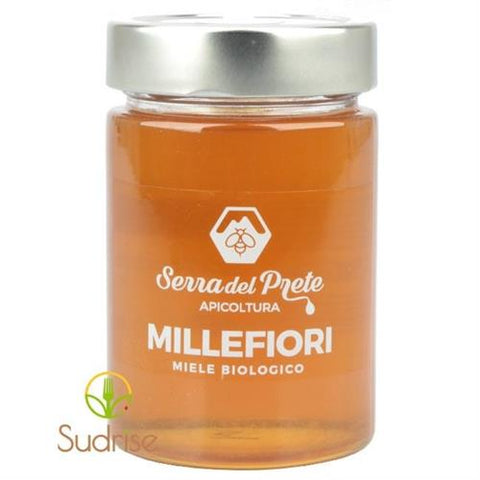
Honey... this is well-known

Since the dawn of civilization, honey has been defined as "the drink of the gods." As early as a thousand years before Christ, all its numerous properties were known and exploited: from therapeutic use to cosmetics and cooking. The expression "honeymoon," for example, dates back to the times of Babylon when newlywed couples were given "mead," a special drink (made from honey, yeast, and water), which was believed to promote fertility. Today, science has identified more than 200 important elements in honey.
COMPOSITION OF HONEY
Over 300 different compounds have been identified in honey, its main components are:
sugars (the main ones are: glucose and fructose), about 75-80%
water, 16.6-18.5%
minerals and vitamins
organic acids
nitrogenous substances
enzymes, aromas, and trace elements
The great advantage of honey is its ability to provide the body with readily available calories (it provides 320 calories/100 g) without requiring digestive processes and without introducing indigestible or harmful substances at the same time. The richness of fructose gives honey some properties that other sweet foods do not have.This sugar is responsible for the highest sweetening power, the prolonged energy effect, and the easy digestibility of honey: glucose is burned immediately, entering the bloodstream directly, while fructose is consumed more slowly and serves as an energy reserve since, before being used by the body, it must be converted into glucose. Honey is particularly suitable: in the diet of athletes and students; for the elderly, those with poor appetite, or the sick, due to its high nutritional value that is easily assimilable; for young people and children.
It is not advisable, except under medical supervision and in very limited doses, for those suffering from diabetes, obesity, or those following a low-calorie diet, as it should be remembered that the energy contribution of honey is significant.In addition to having a very high energy value, honey also possesses countless properties:
Beneficial properties for the stomach, due to its anti-inflammatory and healing action
Beneficial properties for the heart, as it reduces cardiovascular risk
Anti-inflammatory and antifungal properties
A regular use of honey also seems to increase the level of antioxidants in the blood, substances that are so valuable because they protect us from developing many cancers.
COMPOSITION OF HONEY
Over 300 different compounds have been identified in honey, its main components are:
sugars (the main ones are: glucose and fructose), about 75-80%
water, 16.6-18.5%
minerals and vitamins
organic acids
nitrogenous substances
enzymes, aromas, and trace elements
The great advantage of honey is its ability to provide the body with readily available calories (it provides 320 calories/100 g) without requiring digestive processes and without introducing indigestible or harmful substances at the same time. The richness of fructose gives honey some properties that other sweet foods do not have.This sugar is responsible for the highest sweetening power, the prolonged energy effect, and the easy digestibility of honey: glucose is burned immediately, entering the bloodstream directly, while fructose is consumed more slowly and serves as an energy reserve since, before being used by the body, it must be converted into glucose. Honey is particularly suitable: in the diet of athletes and students; for the elderly, those with poor appetite, or the sick, due to its high nutritional value that is easily assimilable; for young people and children.
It is not advisable, except under medical supervision and in very limited doses, for those suffering from diabetes, obesity, or those following a low-calorie diet, as it should be remembered that the energy contribution of honey is significant.In addition to having a very high energy value, honey also possesses countless properties:
Beneficial properties for the stomach, due to its anti-inflammatory and healing action
Beneficial properties for the heart, as it reduces cardiovascular risk
Anti-inflammatory and antifungal properties
A regular use of honey also seems to increase the level of antioxidants in the blood, substances that are so valuable because they protect us from developing many cancers.
Buy organic artisanal Lucanian honey online at www.sudrise.com
In addition to all its nutritional virtues, honey is also an excellent ally in skin care as it has a moisturizing, softening, emollient, refreshing, and illuminating action, also preventing the onset of wrinkles. It also promotes the healing of irritated skin and minor burns.
Due to a potential risk of carrying Clostridium botulinum spores (the bacterium responsible for botulism), the U.S. health authority (the Food and Drug Administration) advises, as a precautionary measure, against using honey in children under one year of age.
Perhaps not everyone knows that: The typical image of honey is that of a dense, shiny liquid, amber in color. This has long influenced the honey market, to the extent that anything not conforming to this stereotype was regularly rejected. In reality, crystallization is a natural process and can serve as a verification of its authenticity.
By heating it to 45°C, honey returns to a liquid state, but if this temperature is exceeded, the enzymes, vitamins, and other active substances present in honey become damaged. In the industry, honey is pasteurized, so it always remains liquid, but often, due to the high temperatures reached, considerable biological damage to the product occurs.
Furthermore, to fully enjoy honey, it is advisable for those who use it as a sweetener in milk or other beverages to never add it when these are boiling, but only and always when they are drinkable, as a temperature that is too high takes away a large part of honey's properties.
Dr. Anna Cosentino
Nutritionist Biologist
Visit her Facebook page
In addition to all its nutritional virtues, honey is also an excellent ally in skin care as it has a moisturizing, softening, emollient, refreshing, and illuminating action, also preventing the onset of wrinkles. It also promotes the healing of irritated skin and minor burns.
Due to a potential risk of carrying Clostridium botulinum spores (the bacterium responsible for botulism), the U.S. health authority (the Food and Drug Administration) advises, as a precautionary measure, against using honey in children under one year of age.
Perhaps not everyone knows that: The typical image of honey is that of a dense, shiny liquid, amber in color. This has long influenced the honey market, to the extent that anything not conforming to this stereotype was regularly rejected. In reality, crystallization is a natural process and can serve as a verification of its authenticity.
By heating it to 45°C, honey returns to a liquid state, but if this temperature is exceeded, the enzymes, vitamins, and other active substances present in honey become damaged. In the industry, honey is pasteurized, so it always remains liquid, but often, due to the high temperatures reached, considerable biological damage to the product occurs.
Furthermore, to fully enjoy honey, it is advisable for those who use it as a sweetener in milk or other beverages to never add it when these are boiling, but only and always when they are drinkable, as a temperature that is too high takes away a large part of honey's properties.
Dr. Anna Cosentino
Nutritionist Biologist
Visit her Facebook page









